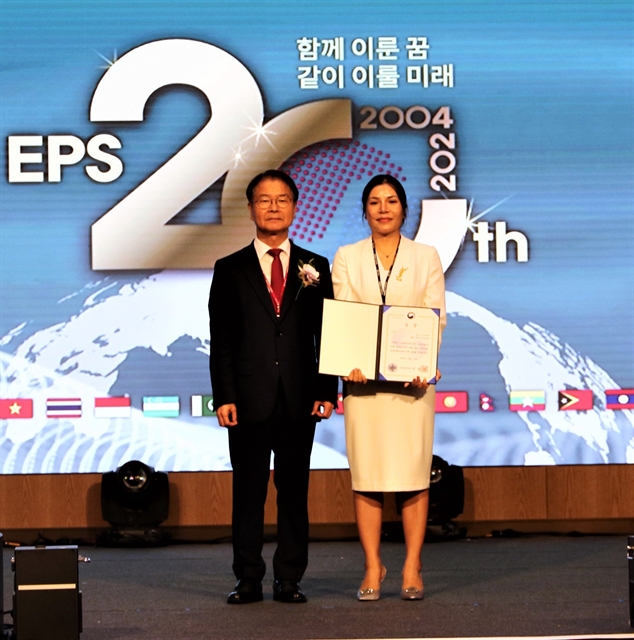 |
| Ngô Thị Út Luân (right) from HCM City receives the award for successful entrepreneurship under the EPS programme. — VNA/VNS Photo Khánh Vân |
HÀ NỘI — Vietnamese workers have earned high praise from Republic of Korea (ROK) employers under the Employment Permit System (EPS), according to officials.
Launched in 2004, ESP targets low-skilled workers, granting them E-9 visas to work in the country's thriving small and medium-sized enterprises.
For 20 years, ESP has helped more than one million people from 16 countries find jobs in ROK, of which Việt Nam takes the largest portion with about 135,000 workers.
In an interview with Vietnam News Agency's reporter, Lim Seung Mook, Vice President of the ROK's Human Resources Development Service (HRDS), emphasised the critical role foreign workers play in sustaining the country's economy amid its aging population and shrinking workforce.
He also revealed that Vietnamese workers had earned a stellar reputation among Korean employers. Their ability to integrate quickly and adapt to the working environment makes them highly sought-after for both initial recruitment and re-employment.
With thousands of Korean companies in Việt Nam, there is also potential for post-ESP Vietnamese workers to return home and contribute to Việt Nam's growth, while maintaining ties with their Korean employers.
At HTM, an auto parts manufacturer in Gyeonggy Province, ROK, seven Vietnamese workers are on the payroll.
HTM Director Mil Pil Hong holds them in high regard. He cited their sincerity, open-mindedness and attention to detail, as the key factors behind the absence of technical errors and workplace accidents in his factories.
There has been an increasing number of ESP workers who are not only excelling in their jobs, but also becoming successful entrepreneurs upon returning home.
Recognising these success stories, HRDS has organised annual contests for returning ESP workers. Việt Nam has shone brightly in recent years, with Ngô Thị Út Luân winning the top prize in 2024 for her thriving business venture back home.
At the award ceremony marking the programme's 20th anniversary, Ngô Thị Út Luân shared her inspiring journey.
Returning to Việt Nam in 2013 after her initial contract ended, her language skills allowed her to re-enter ROK on an E7 visa, reserved for highly-skilled professionals.
Years later, she eventually transitioned to an F2 visa, which signifies long-term residency. Her efforts also led to her membership in the Korea-Việt Nam Business Association in 2016.
She returned to Việt Nam again in 2019 and founded her first business back home one year later. Now, she has three companies with nearly 30 workers on the payroll.
She encouraged her fellow countrymen to make the most of their time in ROK by learning the language and embracing the culture.
With this long-term commitment, she believed Vietnamese workers could return home to become successful entrepreneurs and contribute significantly to Việt Nam's growth.
As ROK's industries evolve, the demand for skilled foreign workers is expected to grow. With their proven track record, Vietnamese workers are well-positioned to play an even greater role in ROK's economy. — VNS


